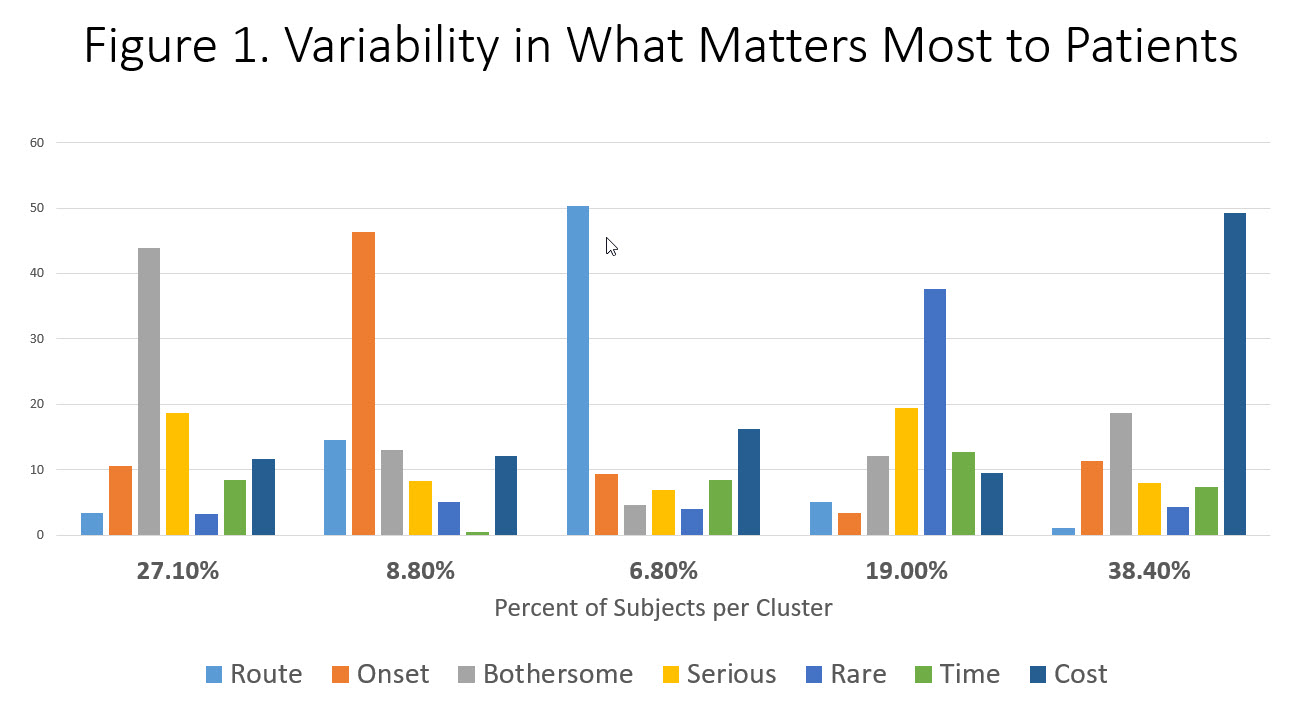Session Information
Session Type: ACR Concurrent Abstract Session
Session Time: 2:30PM-4:00PM
Background/Purpose: Many important treatment decisions for patients with rheumatoid arthritis (RA) are conditional on patient preferences and mandate a shared decision making (SDM) approach. Furthermore, SDM is being increasingly recognized as an important quality measure. One of the most common preference sensitive decisions in RA is how to escalate care when response to methotrexate monotherapy is inadequate. The objective of this study was to examine whether preference phenotypes can be used to promote SDM at the point-of-care.
Methods: 1314 subjects completed a conjoint analysis survey (1048 in English, 266 in Spanish) designed to elicit preferences for triple therapy, FDA-approved biologics and tofacitinib. Five distinct phenotypes were generated using latent class analysis (See Figure). We subsequently created a pamphlet to describe the phenotypes and their implications. To examine the feasibility of using preference phenotypes to promote SDM in the clinic, we performed a pre-post-test study. Consenting RA patients received the pamphlet once roomed by a nurse in the post-phase. Visits in both phases were audiotaped, and those in which there was evidence of active disease were transcribed and analyzed.
Results: 50 visits were transcribed in the pre-phase and 46 in the post phase of the study. The mean age of the study population was 59 years; 85% were female, 68% were Caucasian, and 65% were seropositive. The pamphlet was used in 38 of the 46 visits in the post phase. Thirty-six out of the 38 patients were able to identify with one or more of the phenotypes presented in the pamphlet. A greater number of treatment decisions were concordant with patients’ preferences in the post-phase compared to pre-phase (12% vs 35%). Addition of the pamphlet did not increase the time of the visits. The average time of visits in the pre- and post-phases was 29 and 25 minutes respectively.
Conclusion: The results of this feasibility study suggest that patients can identify with preference phenotypes representing variability in patient values and that introduction of this tool at the point-of-care may increase the likelihood that treatment decisions are concordant with patients’ values.
To cite this abstract in AMA style:
Fraenkel L, Binder-Finnema P, Hsiao B, Wiedmeyer C, Michel G, Nowell WB. Preference Phenotypes Can be Used to Support Shared Decision Making at the Point-of-Care [abstract]. Arthritis Rheumatol. 2017; 69 (suppl 10). https://acrabstracts.org/abstract/preference-phenotypes-can-be-used-to-support-shared-decision-making-at-the-point-of-care/. Accessed .« Back to 2017 ACR/ARHP Annual Meeting
ACR Meeting Abstracts - https://acrabstracts.org/abstract/preference-phenotypes-can-be-used-to-support-shared-decision-making-at-the-point-of-care/


